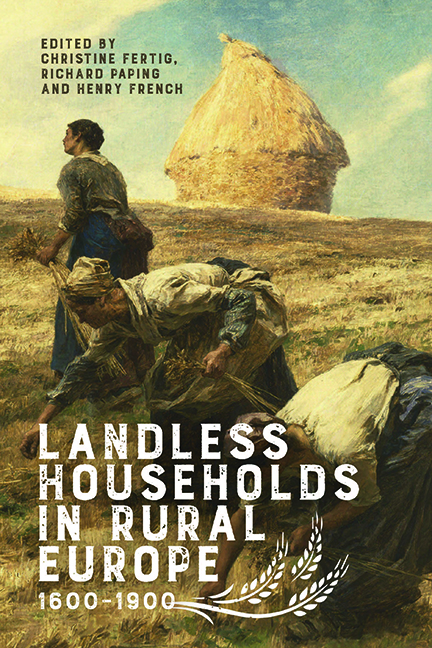Book contents
- Frontmatter
- Contents
- List of Illustrations
- Notes on Contributors
- Preface
- Introduction
- 1 The Treballadors of Girona: Evidence of the Emergence of Wage Labour in Early Modern Catalonia in the Sixteenth and Seventeenth Centuries
- 2 The Squatter Economy of the English Countryside: Building New Landless Communities in England, c. 1600–1900
- 3 The Rise of Landless Households in the Dutch Countryside, c. 1600–1900
- 4 ‘Gaining Ground’ in Flanders after the 1840s: Access to Land and the Coping Mechanisms of Landless and Semi-Landless Households, c. 1850–1900
- 5 Strategies of Survival, Landlessness and Forest Settlement in Flanders: The Forest of Houthulst in a Changing Landscape of Survival (c. 1500–1900)
- 6 Landless and Pauper Households in England, c. 1760–1835: A Comparison of Two Southern English Rural Communities
- 7 Landless Rural Households in France, 1852–1910
- 8 Survival in a Hostile Agrarian Regime: Landless and Semi-Landless Households in Seventeenth-Century Sweden and Finland
- 9 Farming Craftsmen? Access to Land and the Socio-Economic Position of Rural Artisans in Early Modern Finland
- 10 Landlessness and Marriage Restrictions: Tyrol and Vorarlberg in the Eighteenth and Nineteenth Centuries
- 11 Cottages, Barns and Bake Houses: Landless Rural Households in North-Western Germany in the Eighteenth Century
- Bibliography
- Index
- Boydell Studies in Rural History
7 - Landless Rural Households in France, 1852–1910
Published online by Cambridge University Press: 08 October 2022
- Frontmatter
- Contents
- List of Illustrations
- Notes on Contributors
- Preface
- Introduction
- 1 The Treballadors of Girona: Evidence of the Emergence of Wage Labour in Early Modern Catalonia in the Sixteenth and Seventeenth Centuries
- 2 The Squatter Economy of the English Countryside: Building New Landless Communities in England, c. 1600–1900
- 3 The Rise of Landless Households in the Dutch Countryside, c. 1600–1900
- 4 ‘Gaining Ground’ in Flanders after the 1840s: Access to Land and the Coping Mechanisms of Landless and Semi-Landless Households, c. 1850–1900
- 5 Strategies of Survival, Landlessness and Forest Settlement in Flanders: The Forest of Houthulst in a Changing Landscape of Survival (c. 1500–1900)
- 6 Landless and Pauper Households in England, c. 1760–1835: A Comparison of Two Southern English Rural Communities
- 7 Landless Rural Households in France, 1852–1910
- 8 Survival in a Hostile Agrarian Regime: Landless and Semi-Landless Households in Seventeenth-Century Sweden and Finland
- 9 Farming Craftsmen? Access to Land and the Socio-Economic Position of Rural Artisans in Early Modern Finland
- 10 Landlessness and Marriage Restrictions: Tyrol and Vorarlberg in the Eighteenth and Nineteenth Centuries
- 11 Cottages, Barns and Bake Houses: Landless Rural Households in North-Western Germany in the Eighteenth Century
- Bibliography
- Index
- Boydell Studies in Rural History
Summary
In France, the nineteenth century was a time when many people dreamed of becoming landowners. Novelists, like Émile Zola and Jules Michelet, and urban officials emphasised and criticised rural men's attachment to land. In fact, the urban upper and middle classes competed with peasants to own land. They coveted property so as to gain a private income, as well as the prestige and the voting rights it conferred before universal male suffrage was achieved in 1848. Peasants dreamed of possessing their fields, that is, of owning their means of earning a living and becoming economically independent. Property meant liberty. Moreover, governments privileged small owners because they were supposed to be attached to the established order. Nonetheless, many rural households were landless. We might assume that this was simply because they could not afford to purchase land. However, landless households were sometimes headed by merchants or craftsmen, who might be more prosperous than labourers but who only purchased land if they were very well off. Consequently, most landless rural households were unskilled or semi-skilled workers active in agriculture, some of whom might also have been active in other economic sectors.
Surprisingly, historical research on French rural workers is limited. In 1986, Yvonne Crebouw studied wages and wage workers in the nineteenth century, and in 1962 Françoise Langlois researched wage workers in the twentieth century. In 1971, Philippe Gratton focused on class struggles in the countryside. Landless households are even more neglected by research than rural workers in general. The latter group featured the volume of essays La Moisson des autres (Harvest for others), which gathered some new research in 1996. Instead, most of the insights regarding rural workers can be found in the kinds of regional studies that flourished in France between 1960 and 1990: a small number of these works devoted some attention to landless households and will be used here. However, the size of this blind spot within the bibliography is illustrated best by the chapter about France in the synthesis Rural Economy and Society, which barely discusses the landless.
- Type
- Chapter
- Information
- Landless Households in Rural Europe, 1600-1900 , pp. 170 - 195Publisher: Boydell & BrewerPrint publication year: 2022



